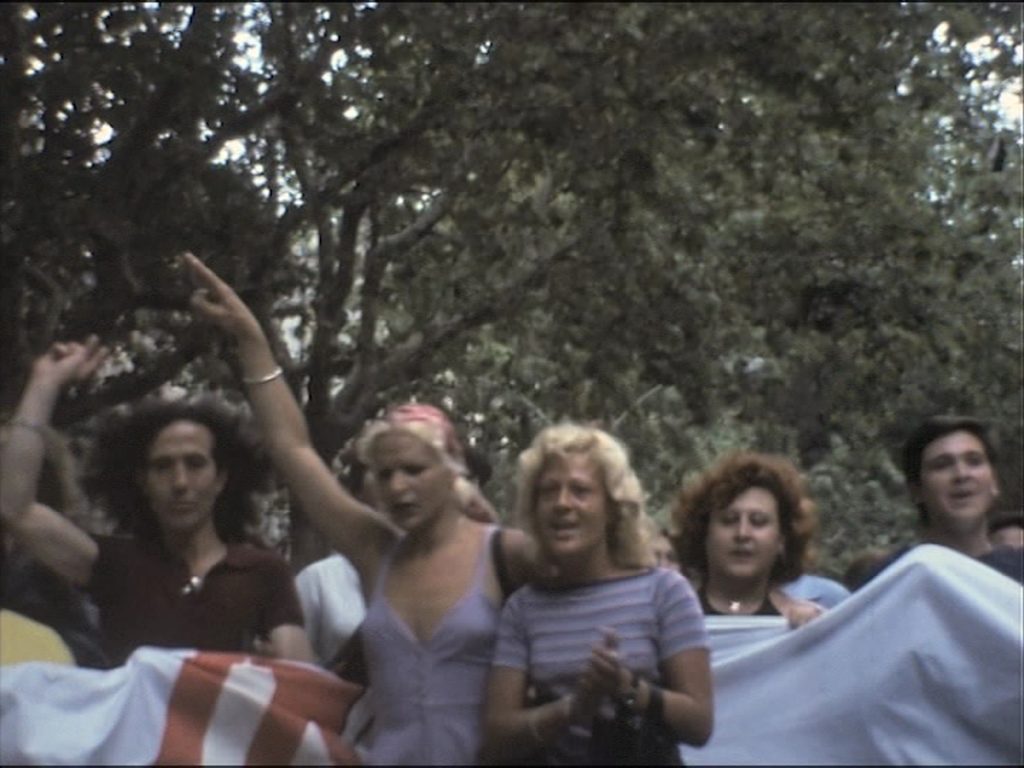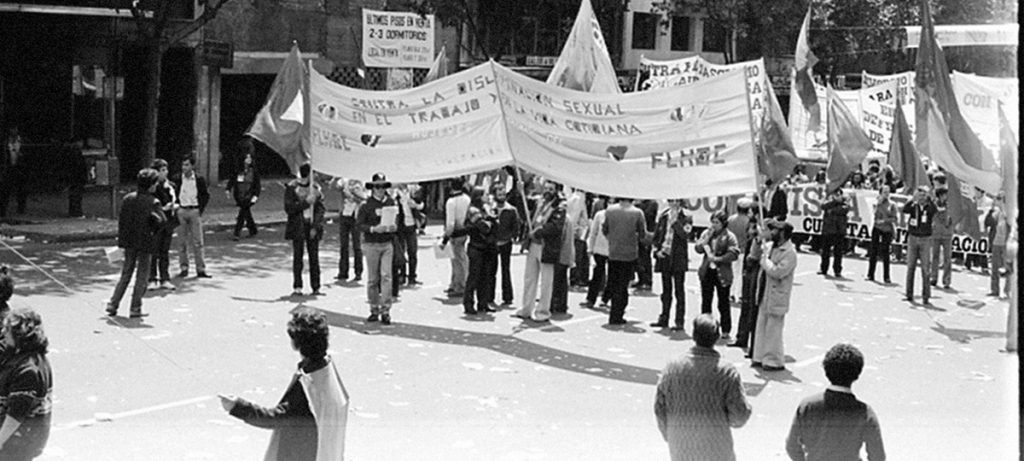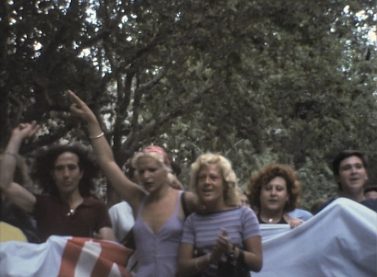Resistance from the Queer South: uses of the past, peripheries and the spaces of sexual liberation
The conference “Resistance from the Queer South” wants to be both an occasion for historical reflection and research and a space for methodological experimentation. While we are focused on the production of “hard” knowledge about the queer 1970s in Spain, we welcome—encourage, in fact!—alternative research methodologies and styles of presentation.
The Conference is part of the activities of the Collaborative Research Project CRUSEV-“Cruising the 1970s: Unearthing Pre-HIV / AIDS Queer Sexual Cultures”, leadered by Glyn Davis (University of Edinburgh) and funded by the Research and Innovation Program Horizon 2020-Humanities in the European Research Area (HERA), Grant no. 649307. The Conference is coordinated by the University of Murcia in collaboration with the Intitut Valencià d’Art Modern (IVAM), de Valencia.
CRUSEV partner universities: University of Edinburgh (Project Leader), Humboldt Universität, Universidad de Varsovia, Universidad de Murcia, University of Newcastle, Universidad Politécnica de Valencia, Universidad de Valencia, Universidad Carlos III de Madrid, Universidad Autónoma de Madrid, Universidad de Castilla-La Mancha, Oxford-Brookes University.
PROGRAM
Thursday, April 26, 2018
16.30-18.30 h.- Film program: SUBVERSIVE SEXUALITIES IN SPANISH UNDERGROUND CINEMA, 1969-1982.
- Aquarium, Iván Zulueta, 1975. 15 min
- Fosca, Carles Comas, 1977. 10 min
- El otro Luis, Alejo Lorén, 1977. 23 min
- Manifestació per l´Alliberament Gai del País Valenciá, Miquel Alamar / Pedro Ortuño, 1979-2015. 7 min
- Cucarecord, Els 5 QK’s, 1977. 8 min
- Entre actos, Cecilia Barriga, 1982. 2 min
Curators: Alberto Berzosa, Juan Antonio Suárez and Virgina Villaplana
Friday, April 27, 2018
10.00-11.45 h.- GENEALOGÍAS DISIDENTES [DISSIDENT GENEALOGIES]
- Brice Chamouleau (Université Paris 8 Vincennes-Saint-Denis), Resistencias ‘queer’ a la impolítica hispánica en tiempos del consenso. [Queer resistances to Spanish “impolitics” in times of consensus]
- Kerman Calvo (Universidad de Salamanca), ¿Lees en inglés o en Francés? El origen de las ideas liberacionistas en España. [Do you read English or French? The origin of liberationist ideas in Spain]
- Francisco Molina (UNED-Centro Asociado de Mérida), La tensión entre teoría y biografía: Las sexualidades disidentes en el ocaso de las dictaduras ibéricas. [The Tension between theory and biography. Dissident sexualities in the twilight of Iberian dictatorships]
- Javier Ugarte (Investigador independiente), Antes de que nacieran las identidades LGBT. [Before the Birth of LGBT Identities]
Moderator: Gracia Trujillo (Universidad de Castilla La Mancha)
11.45-12.15 h.- Break
12.15-14.00 h.- NARRATIVAS FÍLMICAS. ILUMINANDO EL CUARTO OSCURO [FILM NARRATIVES. LIGHTING UP THE CLOSET]
- Santiago Lomas (Universidad Carlos III de Madrid), Hacia una reconsideración de lo homosexual en el cine español del segundo franquismo: el caso de Casa Flora (1973) [Reconsidering homosexuality in the Spanish cinema of the second Franco era: The case of Casa Flora (1973)]
- Eduardo Nabal (Investigador independiente), Otra mirada a Eloy de la Iglesia [Another Look at Eloy de la Iglesia]
- Alberto Berzosa (Universidad de Murcia), Cine y sexpolitique en los años 70. [Cinema and sexpolitique in the 1970s]
- Alejandro Melero (Universidad Carlos III de Madrid), Archivo y censura en el cine sexploitation del tardofranquismo. [Archive and censorship in sexploitation film in late Francoist Spain]
Moderator: Alberto Mira (Oxford Brookes University)
14.00-16.00 h.- Lunch break
16.00-17.30 h.- ARCHIVOS PRECARIOS/ARCHIVOS MILITANTES I. [PRECARIOUS ARCHIVES / MILITANT ARCHIVES I]
- Rafael M. Mérida Jiménez (Universitat de Lleida), Archivos y contrarchivos trans* para la España de los años 70. [Trans* archives and counter-archives for 1970s Spain]
- Diego Marchante (Universitat de Barcelona), Archivo T*. Hackeando el archivo desde una perspectiva transfeminista y queer. [T* Archive: Hacking the archive from a queer and transfeminst Perspective]
- Julen Zabala (Universidad del País Vasco / Euskal Herriko Unibertsitatea), ¿POR QUÉ NO(S) T.E.M.E.I.S? Tiempo, Espacio y Memoria de las Expresiones e Identidades Sexuales: aproximación a la producción científica y archivos serodiscordantes sobre la disidencia sexual. [The Time, space, and memory of sexual identities and expressions: Scientific production and serodiscordant archives on sexual dissidence]
Moderator: Francisco Godoy (Matadero Madrid)
17.30-18.00 h.- Pause
18.00-19.30 h.- ARCHIVOS PRECARIOS/ARCHIVOS MILITANTES II. [PRECARIOUS ARCHIVES / MILITANT ARCHIVES II]
- Alejandro Simón/Marta Echaves/Jesús Bravo (Universidad Complutense de Madrid/ Sala d’Art Jove de Barcelona/ Activista), A veces resulta inquietante que no sepamos de dónde vienen las formas de vida que hoy nos habitan. [Sometimes, it is unsettling not to know where the lifestyles that inhabit us come from]
- Olga Maroto (Investigadora independiente / Independent Researcher), Desempolvando el archivo LGTBIQ y feminista de la ciudad de Valencia. [Dusting up the LGTBIQ and feminist archives of the city of Valencia]
- Felipe Rivas (Universidad Politécnica de Valencia), La poética tecnobarroca de un archivo homosexual. [The Technobaroque poetics of a homosexual archive]
Moderator: Jesús Carrillo (Universidad Autónoma de Madrid)
19.40-20.40. CONVERSACIÓN: POÉTICAS LÉSBICAS EN LOS AÑOS 70 [CONVERSATION: LESBIAN POETICS IN THE 1970S]
Salón de Actos
- Meri Torras (Universitat Autónoma de Barcelona)
- Mari Chordà (Poeta, pintora, activista / Poet, painter, archivist)
Saturday, April 28, 2018
10.00-11.45 h.- CONTRARELATOS. [COUNTER-NARRATIVES]
- Diego Mendoza (Universidad de Granada), La necesidad política y vital de prácticas de archivo transfeministas/queer/transmarikabibollo desde Andalucía. [The vital and political urgency of a transfeminist/trans-queer archive in Andalusia]
- Bartolomé Limón (Universitat Politècnica de València), Análisis y construcción del movimiento y la figura queer en Sevilla y su contexto desde los 70 hasta nuestros días. [Analysis and construction of the queer movement and queer subject in Seville from the 1970s to the present]
- Pau López (Universitat de València), Reflexividad y empatía como principios metodológicos para el (re)conocimiento de una historia activa, honesta y plural. Un caso desde el estudio del movimiento LGTBI+ valenciano. [Reflexivity and empathy as methodological principles for the (re)cognition of an active, honest, and plural history: The Study of the LGTBI Movement in València]
- Sayak Valencia (El Colegio de la Frontera, Tijuana), Back and forward: Feminismo chicano-lesbiano: disidencia sexual y memoria cuir. [Back- and Forward: Chicano Lesbian Feminism: Sexual Dissidence and Queer Memory]
Modera: Virginia Villaplana (Universidad de Murcia)
11.45-12.15 h.- Break
12.15-13.45 h.- SEXILIOS. [SEXILES]
- Andrea Corrales (Investigadora independiente / Independent Researcher), Geopolíticas de la intimidad I: encuentros de diagnóstico. [Geopolitcs of Intimacy I: Diagnostic Encounters]
- Francisco Godoy (Matadero Madrid), Copi o la dificultad de expresarse. Exilio sexual y performatividad sudaca. [Copi, or the difficulty to speak. Sexual exile and sudaca* performativity]
- Lucía Egaña (Programa de Estudios Independientes-MACBA), Un sexilio frustrado. Memorias familiares de la diáspora [A Frustrated sexile. Family memories of diaspora]
Moderator: Noemi de Haro (Universidad Autónoma de Madrid)
13.45-16.00 h.- Lunch break
16.00-17.30 h.- FIESTAS Y OTRAS RESISTENCIAS. [PARTYING AND OTHER FORMS OF RESISTANCE]
- Lourdes Santamaría (Universidad Miguel Hernández de Elche), El cuarto oscuro del Glam, o cómo ser queer avant la lettre. Contracultura Underground en los textos, cómics y canciones de Rampova Cabaret. [The dark room of Glam, or how to be queer avant-la-lettre. Underground counterculture in the texts, comics, and songs of Rampova Cabaret.]
- Alejandro Martín y Javier Cuevas (Universidad de Málaga), Torremolinos, 1962-1971: de la fiesta como resistencia a la redada. [Torremolinos, 1962-71: From the party as a form of resistance to the police raid]
- Iñaki Estella (Universidad Carlos III de Madrid), Políticas del cabaret durante los 70 en Barcelona. [The Politics of cabaret in 1970s Barcelona]
Moderator: Juan Vicente Aliaga (Universitat Politècnica de Valencia)
17.30-18.00 h.- BREAK
18.00-18.40 h.- PERFORMANCE DE CIERRE: Antitrenimiento, de Graham Bell Tornado. [CLOSING PERFORMANCE: Antiteinment, by Graham Bell Tornado]
Museum Lobby
“Documents for the congress You can access the contents that will be covered in the round tables through this link.”







